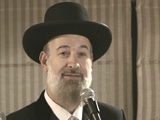- Sections
- Parashat Hashavua
27
There are many elements to waging war. In the battlefield, people use weapons to kill or incapacitate. Today, technology is employed against the enemy, whether operated in the battlefield from afar or by infiltrating their important systems. Psychological warfare is a modern and ancient tool. Last week, we read the Torah’s instructions to soldiers not to be afraid of an intimidating army (Devarim 20:1-3).
A midrash (cited by Da’at Zekeinim MiBaaelei HaTosafot) highlights how the Torah regards the psychological element of battle. It compares the plagues that Hashem employed against the Egyptians to that of a king who was betrayed by a country. First, the king may attack their water supply (parallel to the plague of blood), then his forces make great noises with trumpets and shofars to scare the people (parallel to the frogs).
Let us now connect this to the book. In ancient times, few simple citizens knew how to read and write. Until the printing press, there were not many reading materials, but a small amount of parchments and even things written on earthenware materials. In Jewish tradition, though, great efforts were put into ensuring that even young children began to learn to read. The gemara (Bava Batra 21a) tells of how Yehoshua ben Gamla built an educational system to ensure that even underprivileged children could study Torah. (A fascinating archeological find near Rosh Ha’ayin uncovered writing in Ancient Hebrew letters that was apparently written by a young child.)
The connection between the sword and the book seems to have been employed some 2,700 years ago. After the Aramite Sargon conquered the region of Samaria from the Northern Kingdom of Israel, his son, Sancheriv, tried to conquer Jerusalem as well. As part of the effort, he enlisted the help of a Jewish apostate named Ravshakeh, who was fluent in Hebrew in addition to the international language of Aramaic. Ravshakeh approached the walls of the besieged Jerusalem to call out to the city’s general populace in their language to convince them to surrender (see Melachim II, 18:17-37). King Chizkiyahu’s officers tried to convince Ravshakeh to speak in Aramaic, but as part of his psychological warfare, he refused. The navi tells that Ravshakeh applied even more pressure by "writing books that blasphemed Hashem" and said that He would not be able to save Chizkiyahu (Divrei Hayamim II, 32:17).
We do not know definitively what was in these letters or how they were delivered. Perhaps, as part of his attempt to strike fear in the individual citizen of Jerusalem, his short words of blasphemy were written on small parchments that were attached to arrows and shot into the city. Because the entire populace was literate, it was possible to shake the confidence of more people. So went the plan to use the Jewish People’s strength against them.
With Divine Mercy, the ploy did not work, unity prevailed, and Chizkiyahu survived through a miracle. May all of our present-day enemies also be thwarted.

Parashat Hashavua: The Significance of a Famine
Rabbi Yossef Carmel | kislev 5785

Not How You Start But How You Finish
Rabbi Yossef Carmel | Tevet 12 5779

An Angel of a Man
Rabbi Yossef Carmel | Kislev 12 5779

Parashat Hashavua: Did the Sinners from Gaza Convert?
Rabbi Yossef Carmel | Shevat 5785

Flying High - A Traveler’s Guide to Channukah
Rabbi Yirmiyohu Kaganoff | Kislev 5768

Could Zionism Be Just Another False Messiah?
Rabbi Ari Shvat | 5769

Could Zionism Be Just Another False Messiah?
Rabbi Ari Shvat | 5769

Pirkei Avot between Pesach and Shavuot
Rabbi Berel Wein | 5769
Daf Yomi Makkot Daf 9
R' Eli Stefansky | 19 Nisan 5785
Daf Yomi Makkot Daf 7
R' Eli Stefansky | 17 Nisan 5785

P'ninat Mishpat: Unsuccessful Transfer of Yeshiva – part IV
based on ruling 82138 of the Eretz Hemdah-Gazit Rabbinical Courts
Beit Din Eretz Hemda - Gazit | Nisan 5784








